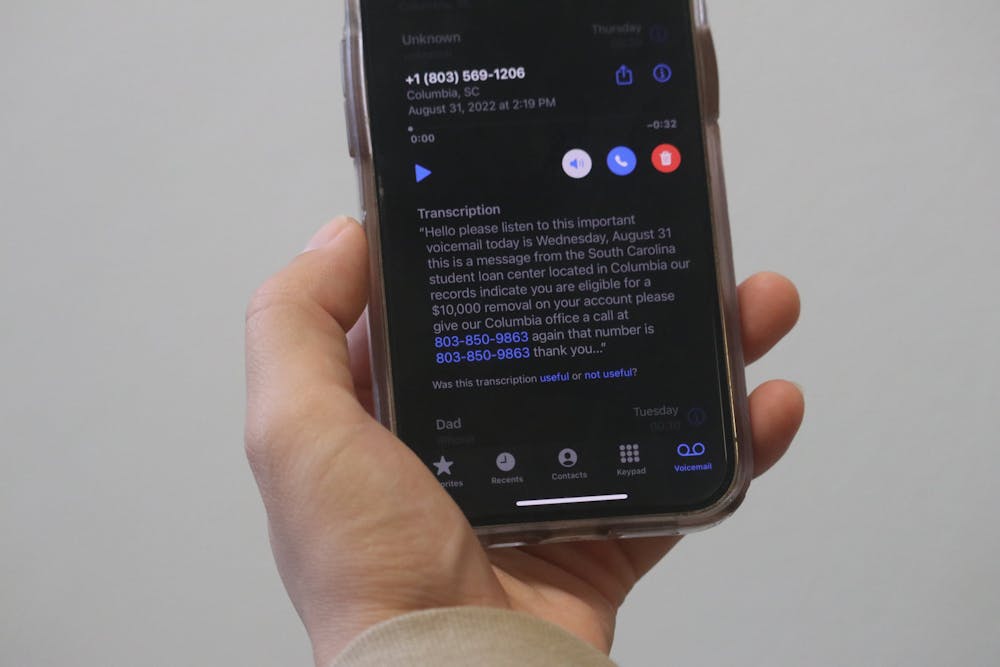
President Joe Biden announced his plan to provide $10,000 in debt cancellation for millions of Americans and up to $10,000 more for people with great financial need, there have been spam calls targeting people with student loans. Elon University’s Director of Information Security Gary Sheehan explained how to avoid scams, what to do if you receive a scam and ways to report these scams.
This interview has been edited for clarity.
If a student receives a call, or if anybody receives a call, should they block the number— What's the best method?
"There's at least two things they can do. They can block the number and then they can report it to the federal trade commission. The FTC does have a complaint center on its website that students can report the scammers or scams to, they can even check that to see if anybody else is being scammed by this. And they do have some good guidelines out there that students can use in order to help either prevent future scams or what to do in the event that they gave up their information already.”
If you answer a scam call, what should you do?
“Hang up, really that's it. Because the first thing you'll maybe even get a recording saying, ‘Hey, we've identified you as having a loan. If you'd like to pursue this, hit one or dial us at this number,’ and then it would hang up. If it is a live person, again, if it's not your loan service provider or the Department of Education, just hang up. You can say, ‘Please don't call me again,’ because then they, by law, they shouldn't call you, but that's about all you can do. And then you can block the number on your phone if you'd like.”
Is there anything that can prevent you from receiving scam calls?
"Unfortunately there's nothing that's going to prevent those calls. They'll come in as a call, an email and even texts. So really everybody asked all the students to be wary of all that type of communication they're getting. And there's nothing to stop the scammers because a lot of this information, it could either be public information already or it could be gleaned from some breach that might have happened at the Department of Education that really nobody knows about yet. So there's not much you can do to stop it.
But really the key is in how to react to it. And to me it's, you can ignore it, you can report it. If you get an email don't even open it. If it's from somebody you don't know, don't even respond to it, just mark it as junk or you can block it in your email system so you don't get any more emails from that. Once you answer an email or open it, even if you don't click on anything, they don't necessarily have your information, but they know you're a person, they know someone's on the other end and now we can pursue that further. So the key to me is just ignore it and try and get rid of it.”
Should you open anything if you are unsure whether or not it is a scam?
“I don't even have a student loan and I'm, I'm getting these why? Because my kids went to school and they have student loans and they think I'm paying their student loans off, but I'm not so,I get a text, I just delete it. Don't even open the text. Don't even open the email. You're not gonna miss anything by not opening an email somewhere.Truly for loan forgiveness through the government, you got plenty of time. You don't have to be in a hurry to file anything. You'll get contacted usually either by your provider or you can go out to the Department of Education website and you can apply for forgiveness if you don't get contacted. And then don't reply to anything unless it's from the Department of Education.”
Is there anything you should do if you open a scam email or text message?
“If you opened it and clicked on something and provided some sort of information then yes, and unfortunately there's not a whole lot you can do in that vein either because once you open and you provide that information, you've proved to them that you're real, that you have some information to give them, that you probably are a loan holder. So now they can find different ways to get in contact with you again, maybe through a different means. The best thing to do is just not open them at all.
Another important part is don't open them on your phone either. You know, we try to tell the young adults that if you get these types of emails and you're not sure of them wait till you can open them on a computer so you can analyze them better. Opening them on a phone, just, it really presents too many issues. And once you do, it's kind of harder to tell whether it's a scam or not. Because a lot of times the web browsers on your phones don't give you enough information to determine that. So I try to tell folks if you get any emails that you think might be suspicious, wait till you can get on a computer before you open it.”
Are there key identifiers to know if something is a scam?
“There's a couple, one is always look at the name of the person emailing you and try to match that to the email address. Now on your phone, that's very hard to do unless you know which buttons to hit. To do that on a computer, it's very simple. They give the name and it's the ‘from’ email address. You wanna look at the email and see if they're really pushing you or making it sound urgent, to do this right away. ‘Hey,’ you know, ‘we've only got one more week,’ and that, ‘we can get you this best deal,’ or, ‘if you don't act today, we can't help you anymore.’ If you see anything like that, it's a scam. There's no rush to do any of this. So you look at the email address, you look at the content, you wanna look at the signature of the email as well.
And does it look like it comes from a reputable company, or is there no signature on the bottom, or is it just some company that might have a PO box? You wanna make sure you know where the email's coming and the signature should match the sender to some degree. If it's from a signature, if they have a company name, it should be a company name in the email address. Never respond to anything business oriented from a Gmail account. It always should be from a business account. And then finally look at the wording within the email. Is it worded properly? Does it sound like a business email or is it written by a 12 year old?”


